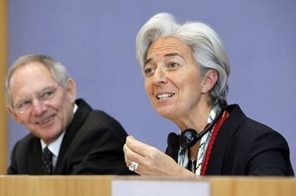Germany agrees tax on banks as crisis buffer
BERLIN: The German government agreed Wednesday on a new tax on banks for a fund which could be used for bailouts in the event of another banking crisis, Finance Minister Wolfgang Schaeuble said.
Financial institutions will pay up to a combined 1.2 billion euros (1.6 billion dollars) annually into a common pool for potential rescues if banks get into difficulty, the minister added.
The proposals "aim to draw lessons from the financial crisis and put precautions in place so that such a crisis does not occur again or does not reach the same level," Schaeuble said.
Banks will be taxed according to their size and their importance to the overall banking sector, agreed the cabinet, also attended by French Finance Minister Christine Lagarde.
A draft law should be hammered out before the German government breaks for its summer recess in mid-July, Schaeuble said, adding he hoped the legislation could pass through parliament "fairly quickly."
It was not immediately clear when the tax would come into effect but Schaeuble said: "We do not need to wait for European regulations."
The plan aims to provide a safety net in the case of another banking crisis like the one that rocked the global industry in 2008-2009.
A further aspect of the proposal, to make banks pay for the aid they received in the past, was shelved.
"The tax we discussed today... is geared towards the future. You should not confuse it with the past where all the states handed out financial guarantees," said Lagarde.
Other countries are considering similar schemes. Paris plans a tax on banks whose proceeds will flow directly into government coffers.
US President Barack Obama in January unveiled a plan to tax risky assets of big American financial institutions to recoup the cost of a bailout of the sector that cost hundreds of billions of dollars.
European Union finance ministers are due to discuss the issue at a meeting on April 16 and 17 in Madrid. The European Commission has said it wants a "solution that is coordinated at the global level."






